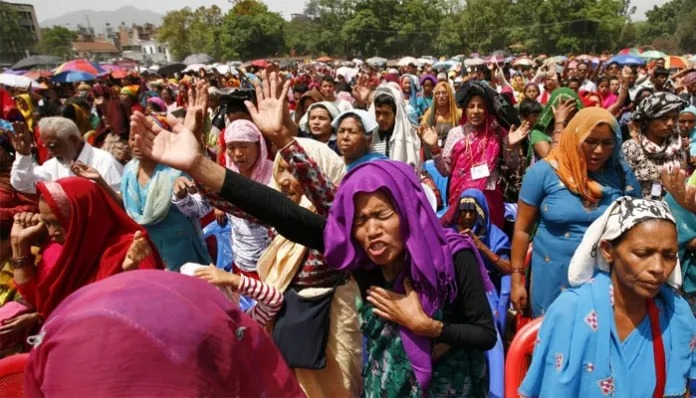In a report published recently on rising missionary conversion activities in parts of Nepal in January this year. The report makes shocking revelations from the ground regarding the conversion of tribes sacred to the region. Those converted belong to the indigenous Tamang community, who used to follow the Lama faith, an ancient spiritual practice.
Notably, many of these tribes come from the Dalit jati and they still (post-conversion) call themselves Dalit only.
Missionaries especially from South Korea, have helped build one of the world’s fastest-growing Christian communities in Nepal. The pastor converting people to this faith said, “Taman people are poor financially and spiritually and a miracle takes place and the whole village converts,” he says.
In the last two decades, as many as seventy churches were built in Nepal. mostly in Dhading district, two hours northwest of the capital Kathmandu. The latest data from the national Christian community survey says there are now 7,758 churches in the still overwhelmingly Hindu country.
Ironically, these churches have been built on the land of Dalits, a local pastor says the community provides the land and then Korean churches help to build the church.
Notably, Nepal has an Anti-conversion law enacted in 2018, as per the law anyone convicted of encouraging someone to change their faith faces up to five years in jail.
Pastor Pang and his wife moved to Nepal in 2003 and then the locals used to worship idols. “I was shocked to see so many idols being worshipped,” says Pang. “I felt Nepal was in desperate need of the gospel,” he said.
Five years later the 240-year-old monarchy was abolished following a decade of civil war, and a coalition government came to power, this brought the golden age for missionary work, said Pang.
Notably, the Christian community makes up less than 2% of Nepal’s population, Hindus account for about 80% and Buddhists 9%, but census data reveals its growth.
In 1951 there were no Christians in Nepal and just 458 in 1961. But by 2011, there were nearly 376,000 and the latest census estimates the community is now around 545,000.
As far as the anti-conversion law is concerned it is only Christians who have been charged under the law, but no one has been convicted. Cases have either been thrown out due to a lack of evidence or defendants have been acquitted on appeal.
Each year more than 2,000 Nepali students travel to Korea to study. It is there they come in touch with the missionary activities. Pastor Dilli Ram Paudel, went to Korea to study and returned as a Christian and now heads the Nepal Christian Society.
Paudel said, “I was alone and friendless,” he recalls, “and then some people gave me a Korean bible in the Nepali language. Somehow they found the Nepali language one.”
He converted and now spreads missionary work in Nepal. He said, “Doing evangelical work within Nepal is a challenge. So we have alternative ways,” he says. “Our mission is to convert – as Pastor Dilli Ram Paudel was a Hindu priest when he was younger – any souls we can, so we must remain undercover.”
People like Pang and Paudel say, ‘In the cities, the anti-conversion law feels much more real. But in the countryside, there are less eyes watching’.
The correspondent spoke to former Deputy Prime Minister of Nepal Kamal Thapa about the rapid conversions that have been happening in the country. Thapa said the culture of the country was at stake. He said, “It’s spreading like wildfire. Cultural identity is at stake. The fabric of the national unity is at stake.”
He said, “Missionaries are working behind the scenes, exploiting the poor and ignorant people and encouraging them to convert to Christianity. This is not a case of religious freedom. This is a case of exploitation in the name of religion.”
Read the report here:














Comments